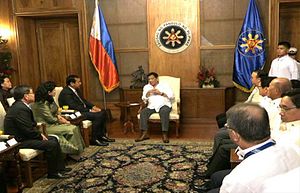This week, the Philippine and Cambodian governments announced that they had concluded a new defense pact following the second iteration of a joint commission set up to advance bilateral cooperation. Though details are still quite sparse, the development nonetheless highlighted the ongoing collaboration between the two countries since President Rodrigo Duterte came to power last year.
Though the historical ties between the Philippines and Cambodia stretch back centuries, the formal establishment of contemporary ties began in 1957 and continued despite the turbulence that the Vietnam War and the rise and fall of the Khmer Rouge generated. While agreements had been signed on various issues in the post-Cold War period, the countries more recently decided to set up a Joint Commission for Bilateral Consultations (JCBC), which would be a forum for both sides to review past agreements and undertake new areas of cooperation as well.
The first JCBC meeting was held in Phnom Penh in December 2011 during the previous Philippine government led by Benigno Aquino III. Since then, agreements in various security and economic areas – from law enforcement to air services – have been either signed or reviewed. But no subsequent official meetings of the JCBC had been held.
Under Duterte so far, ties have warmed, in part due to policy shifts – including on the South China Sea, which had previously been a key source of friction – but in part also due to wider regional developments such as the Philippines’ holding of the annually rotating chairmanship of the Association of Southeast Asian Nations (ASEAN). Indeed, Duterte has already visiting Cambodia twice – first in December last year as part of a wider Southeast Asian tour typically done by the holder of the annually rotating chair, and the second in May this year for the World Economic Forum (WEF). Ties were expected to be in focus this year with the commemoration of the 60th year of the establishment of diplomatic relations.
From December 5 to December 7, Cambodian Foreign Minister Prak Sokhonn led a delegation to pay an official visit to the Philippines at the invitation of his Philippine counterpart Alan Peter Cayetano. He was accompanied by several other officials, including those from the ministries of commerce, interior, and defense, along with Cambodia’s Ambassador to the Philippines Tout Panha. Though there were several interactions held as part of the visit, including a courtesy call paid on Duterte (who hailed the inroads being made in the economic side of the relationship), the main objective was the convening of the second meeting of the JCBC – the first in six years – where the overall relationship would be discussed.
One of the two documents signed at the conclusion of the JCBC, apart from the agreed minutes of the meeting, was a defense pact between the two countries (the other was an agreement on the prevention of looting and the illicit trafficking of cultural property to implement an agreement on culture reached back in 2015). Philippine Defense Undersecretary Ricardo David Jr. and Cambodian Defense State Secretary Neang Phat signed what was officially termed the Memorandum of Understanding (MOU) on Defense Cooperation between the Ministry of National Defense of the Kingdom of Cambodia and the Department of the National Defense of the Republic of the Philippines.
Few details were publicly disclosed by both sides on the new agreement. But similar agreements of this ilk in other relationships have tended to outline potential interactions in the defense space – such as exchanges or visits – along with functional areas of cooperation, which on the security side in the context of this relationship remain quite basic and have largely centered around issues such as law enforcement, transnational crimes, and terrorism.

































